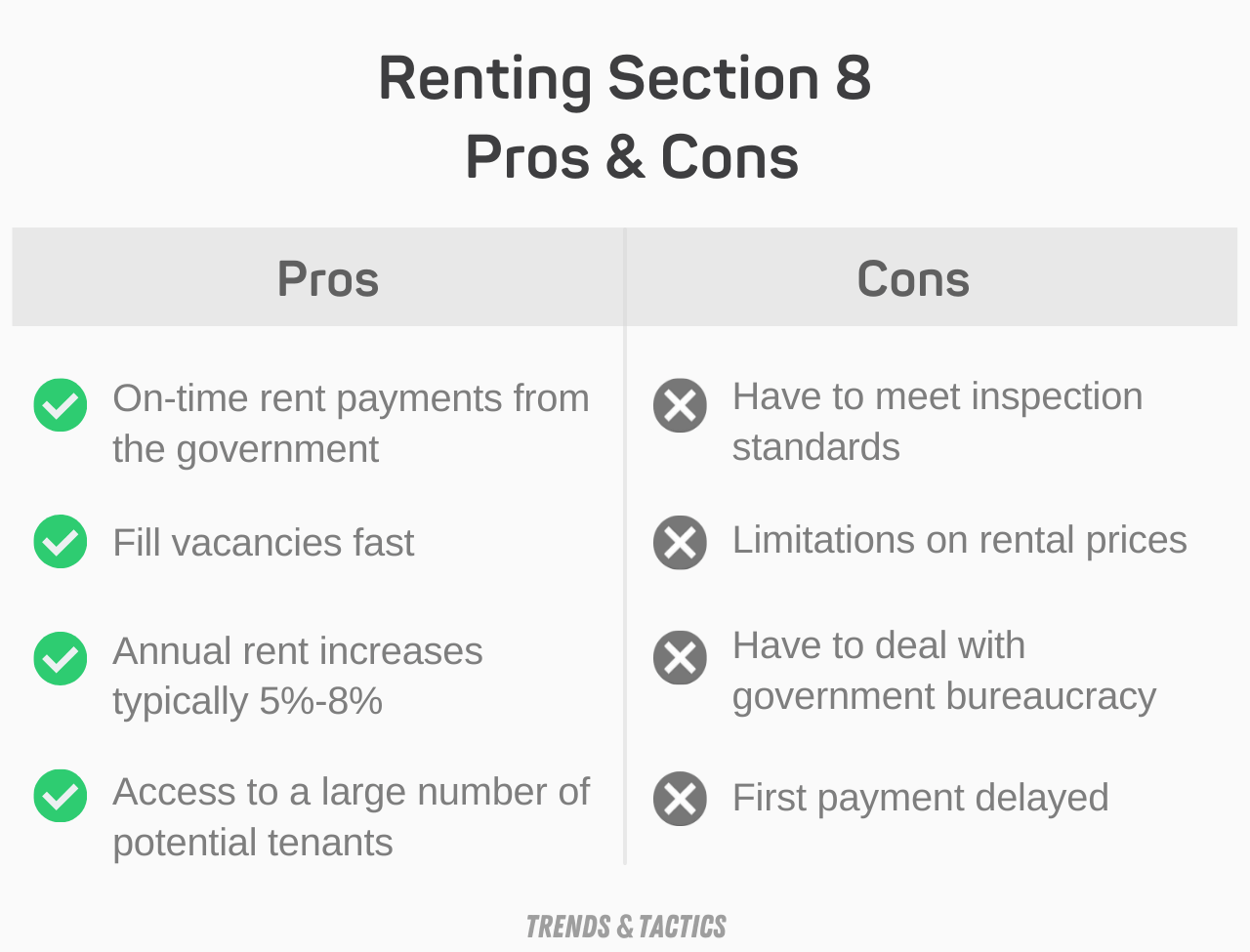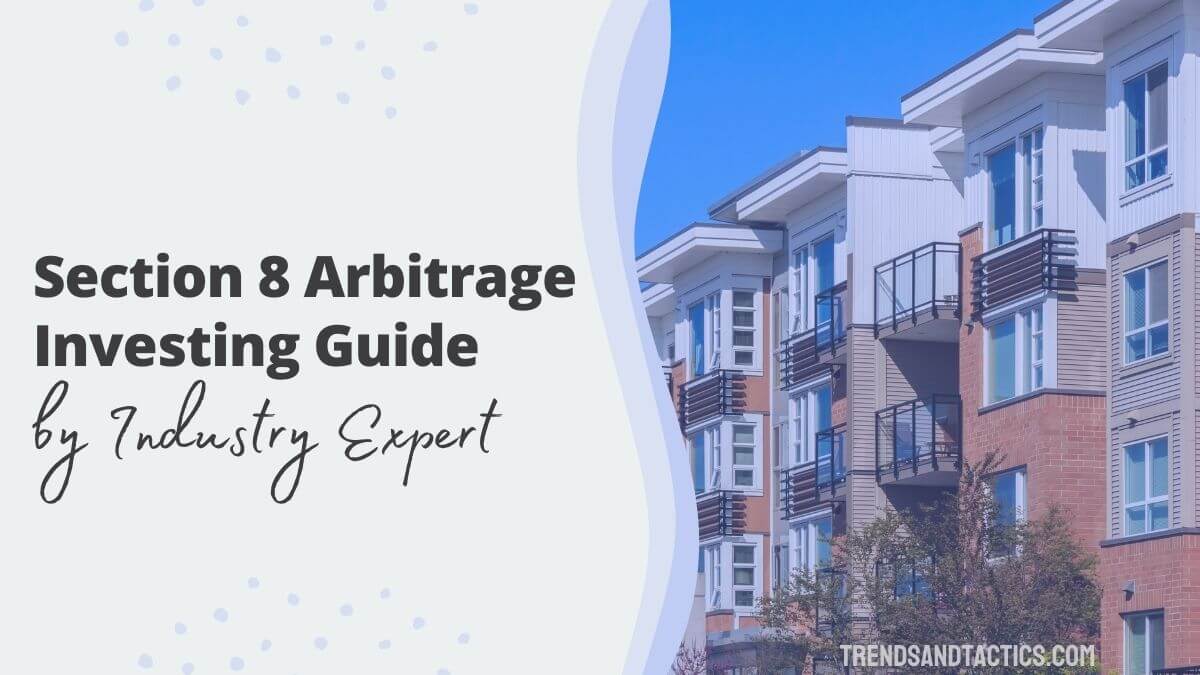Many people shy away from the idea of investing in Section 8 housing, but industry experts say there are a number of benefits to investing in this type of real estate.
From stable cash flow to strong returns, Section 8 investing can be a great way to build your portfolio.
Because it is not a traditional investment, there are a few things you need to know before getting started in Section 8 arbitrage. Keep reading to learn more!
Trend on the Rise
Some states and cities are offering tax breaks and other incentives for landlords who participate in Section 8. These programs are designed to help increase the availability of affordable housing. So, be sure to check with your local government to see if there are any programs that you can take advantage of.
What is Section 8 housing?

Section 8 housing is a government-funded program that helps low-income families, the elderly, and the disabled find affordable housing.
The program provides rental assistance to qualifying families, who then pay a portion of their income towards rent.
The remaining rent is paid by the government, making this a smart way to make money with rental properties.
Section 8 housing is available in both private and public housing developments. In order to qualify for Section 8 assistance, families must meet certain income guidelines.
Families that receive Section 8 assistance typically pay 30% of their income towards rent.
Section 8 housing is a vital part of the safety net for low-income families. It helps to ensure that families have access to safe and affordable housing.
It can also be a great way to get into public housing investing and a unique way for real estate developers to make money.
Tactic for Success
Not every home will qualify for Section 8, so it is important to do your research before buying a property. In order to qualify, the property must meet certain standards set by the government, such as minimum square footage and a number of bedrooms. If the house doesn’t meet these requirements, you could make it a short-term rental to make money on Airbnb instead. The property must also pass an inspection by a Housing Quality Standards inspector.
Section 8 landlord application process:
- Contact Your Local Public Housing Agency – Each public housing agency has its own application process for Section 8 landlords. You will need to contact your local PHA to find out how to apply.
- View Requirements and See if Your Property Fits – The PHA will have a list of requirements that your property must meet to be approved for the program. These requirements vary by agency.
- Complete the Inspection of the Rental Unit – A PHA inspector will need to inspect your unit to make sure it meets housing quality standards. Check out these cheap ways to increase home value that may help you pass the inspection.
- Submit the Application and Required Documents – Once you have completed the inspection, you will need to submit your application and any required supporting documents to the PHA.
- Wait for Approval – Once your application is received, the PHA will review it and determine if you are eligible to participate in the program.
- Once Approved Find Tenants – You can find potential tenants by advertising your unit on the PHA’s website or through local publications.
How to Become a Section 8 Landlord
In order to become a Section 8 landlord, you must first apply and be approved by the Housing Authority.
Once you are approved, you will be placed on a list of available landlords.

When a family is eligible for Section 8 assistance, they will be given a voucher that can be used to rent an approved unit from any participating landlord.
As a Section 8 landlord, you must agree to abide by all program rules and regulations, including maintaining the property in accordance with housing quality standards.
In return, you will receive a steady stream of reliable tenants and a financial subsidy that can help offset the risk of renting to low-income families.
The Advantages of Being a Section 8 Landlord

Being a Section 8 landlord comes with a number of benefits that can make the job easier and more profitable.
For starters, landlords who participate in the program can count on regular payments from the Department of Housing and Urban Development (HUD).
HUD subsidizes a portion of the rent for each Section 8 tenant, which helps to ensure that landlords are paid on time.
Additionally, you will have reduced vacancy. There is normally a long waitlist for Section 8 housing, so you will not have to worry about your unit sitting vacant for very long.
Another advantage is that you will have tenants who are likely to take care of your property since their voucher is at stake.
Section 8 tenants know that if they damage your property or do not pay their rent on time, they could lose their voucher and be forced to move.
As a result, they are usually more motivated to take good care of your property and abide by the terms of their lease.
Tactic for Success
Check the fair market rent prices for similar homes in the area. This will give you a good idea of what you can expect to charge for rent and if the property makes sense as an investment. You can find this information on the HUD website (HUDuser.gov).
Section 8 investing tips:
- Do Monthly or Quarterly Inspections – It’s important to keep an eye on things and make sure your property is in good condition. Look for things like water leaks i.e. running toilet and dripping faucet or showerhead.
- Remove Unnecessary Features – You may want to consider removing any amenities that could easily break and cost you to maintain. For example ceiling fans, screen doors, and garbage disposals.
- Screen Tenants – Take the time to get to know your potential tenants. This includes conducting an in-person interview, running a credit check, and contacting references.
- If Tenants Break the Lease Agreement File for Eviction – Tenants can be removed from Section 8 if they break lease agreements. Filing for eviction right away can help correct any issues right away.
The Disadvantages of Being a Section 8 Landlord

One of the disadvantages of being a Section 8 landlord is the rent restrictions.
This means that landlords cannot charge as much rent as they could if they were not participating in the program.
Another disadvantage is properties have to pass strict inspections. Landlords who fail to meet these standards can be fined or have their Section 8 contract terminated.
As a result, Section 8 landlords must be diligent in ensuring that their properties are up to code, making this one of the top jobs for problem solvers.
One of the biggest problems is that security deposits have to come from the tenant, which can be difficult if the tenant is already having financial trouble.
Additionally, dealing with the ever-changing policies of the program can be challenging.
Just when you think you have a handle on things, the rules are suddenly changed, often with little or no notice.
This can make it difficult to keep up with the paperwork and red tape required to remain in compliance.
Trend on the Rise
Buy HUD homes and turn them into affordable housing. Hud homes are houses that have been foreclosed on and are now owned by the government. These homes are often sold under market value and can be a great way to get started in Section 8 investing.
What is the Difference Between Project Based and Tenant Based Section 8
In project-based Section 8 housing, the subsidy is tied to the property, not the tenant, so it remains with the building even if the tenant moves out.
Project-based Section 8 housing is typically found in larger developments with 50 or more units.
In tenant-based Section 8 housing, the subsidy is tied to the tenant, not the property.
This means that if the tenant moves out, they can take their voucher with them and use it towards renting another property.
Tenant-based Section 8 housing is typically found in smaller developments with fewer than 50 units.
How to Choose Quality Tenants for Your Section 8 Property
High-quality tenants are essential to your success as a landlord.
Not only do they help to keep your property in good condition, but they also tend to be more respectful of their neighbors and the community as a whole.
Here are a few tips for choosing the best possible tenants for your Section 8 property:
First, take the time to screen all applicants thoroughly. This includes running a credit check, contacting references, and conducting an in-person interview.
By taking the time to get to know your tenants before they move in, you can weed out those who are likely to cause problems down the road.
Second, be clear about your expectations from the start.
Let your tenants know what kind of behavior is expected of them and what the consequences will be if they fail to meet your standards. This will help to prevent issues from arising in the first place.
Third, stay involved in your property. Regularly visit the units and get to know your tenants so that you can address any problems that come up quickly and effectively.
By being an active and involved landlord, you can create a happy and healthy environment for everyone involved.
Wrapping Up
Section 8 is a great way to get started in the world of real estate investing.
You can find amazing deals and build long-term wealth if you’re willing to do your homework and put in the work.
Tara is a licensed real estate agent in Southwest, FL. She helps buyers and investors find their dream home by educating them about real estate and how they can use it as an investment.






